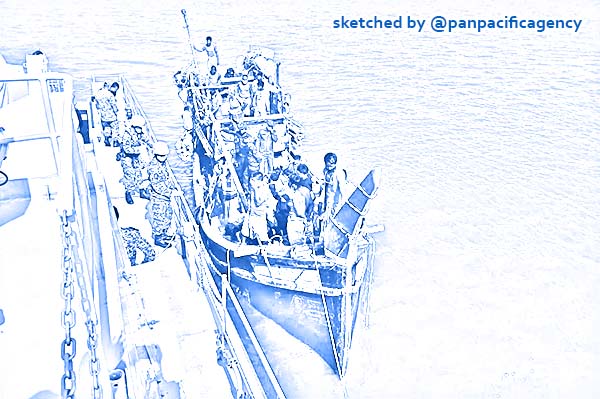[Analytics] Rohingya crisis won’t go away with inaction, silence

Rohingya refugees stranded at sea are seen on a boat near the coast of Cox’s Bazar, Bangladesh, recently. AFP. Sketched by the Pan Pacific Agency.
Part of my job is to document country situations and monitor public sentiment towards refugees in the Asia-Pacific. As I watched how a few comments ignited from the refugee boat pushback recently blazed into a fierce, xenophobic campaign towards the Rohingya people, I was horrified. Rachel Tan specially for the New Straits Times.
In the span of a few days, Malaysians had signed onto petitions, and endorsed Facebook groups and WhatsApp messages chanting harmful demands for the Rohingya to be criminalised and ousted. Some politicians even churned and condoned destructive comments provoking unfounded public anger.
As someone who is an observer of Myanmar, this is a very familiar, extremely dangerous cry. Do we even understand what we are asking for?
Yanghee Lee, the United Nations special rapporteur, an independent expert specially appointed for Myanmar for the past six years, has not produced a single human rights report without the words “violence”, “rape”, “killing” and “deprived of food”.
Her reports consistently paint the recurring themes of torture, cruelty and horrific circumstances forcing the Rohingya into dangerous boat journeys at high costs.
The most recent one catalogued “immense suffering inflicted by the military” in Rakhine and Chin states — brutal killings of innocent women and children.
Dozens of men had disappeared, were tortured and murdered. The severely injured were prevented from receiving urgent medical care, aid workers were targeted and lives taken.
The Internet and communications had been shut down so that these realities are suffocated.
Lee ended her term a few days ago with a strong call for UN investigations with the same warning: what is happening in Myanmar is a “war crime”.
Do we even know what is really happening and why people are leaving? Over a million Rohingya men, women and children have fled for a reason. I have seen the camps and heard from the Rohingya people there myself.
With Bangladesh’s hospitality considered, the Rohingya remain in a precarious situation.
Extreme poverty forcing refugees into the hands of traffickers, sold into exploitative labour in exchange for torture and abuse.
Girls as young as 5 raped. Young children kidnapped and disappear. Monsoon and floods tearing their bamboo huts apart, putting the elderly and immobile at risk. Women and girls forced into sex work to put food on the table. All these with the threat of being returned to Myanmar hanging over their heads.
In one country, they were demoted to being third-class citizens, while in another, they were walled up by the cold metal fences struggling hard to survive and with no access to the outside world. Could one really blame them for seeking some form of life, safety and security?
My Rohingya friend once said: “The solution to the Rohingya crisis does not lie in hatred. But, by restoring their human rights. It is only possible by helping them to get back to their own country with rights, safety, security and dignity. They are travelling illegally because they don’t have travel documents, which is a basic human right.
“All of us must not be ignorant to understand that people are fleeing from a genocide. We want to go back but we can’t.
“If they are not safe in their own country or in countries where they took refuge, then consider creating a space where they can live in safely and in dignity. Otherwise how long do we deserve to be killed, raped, looted and tortured?”
This is not just a Rohingya issue. This is not just a boat pushback issue. This is not a border or national security issue.
This is a humanity issue that tests our compassion, where our values as Malaysians will be demonstrated and recorded. This is a regional issue that acutely needs regional cooperation for a solution.
Much needs to be done to undo and reverse the damage Myanmar has caused, felt even by us Malaysians. The voice we need to amplify is not dissent towards vulnerable people. It is one that should propel our government towards a concerted strategy and action.
As a person who has sat through hundreds of interviews, had personal conversations with refugees and the Rohingya, who witnessed first-hand the desperate conditions of camps of a million people in Bangladesh, who received countless reports of ongoing merciless killings in Myanmar, we should stop reacting to misinformation, but listen and see the realities that are happening.
More importantly, do not sit idle, in silence or in inaction. Malaysia can lead the way.
The writer is programme officer at the Asia Pacific Regional Rights Network (APRRN), a network organisation with a diverse membership of people advancing refugee rights in the region